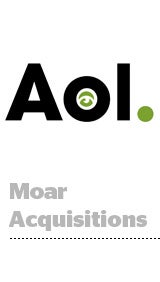By Kelly Liyakasa and Zach Rodgers
Verizon-owned AOL will snap up mobile ad platform Millennial Media, the companies said Thursday morning.
AOL will pay $1.75 per share of Millennial stock, valuing the company at $238 million, as was previously rumored. This price is a considerable premium over the company’s Wednesday close-of-trading market cap of $187 million.
As AdExchanger noted in July, Millennial Media could prove to be the mobile equivalent of AOL’s Adap.tv acquisition – a way to rapidly expand its capabilities and supply in the app ecosystem, where media consumption is rapidly shifting.
Over the last three years, Millennial has sought to upgrade those capabilities by buying first Jumptap in 2013 and then Nexage in 2014.
Additionally, AOL CEO Tim Armstrong may see the acquisition as an opportunity to leverage Verizon’s millions of direct relationships with smartphone users into a scaled mobile ad network play with the deterministic accuracy that only Facebook and Google can bring to bear today.
“There’s a huge piece Millennial really fills for us on the supply side and from an app developer perspective,” Don Kennedy, president of advertiser platforms for AOL, told AdExchanger. “We will add a heck of a lot of really great talent from an engineering and sales perspective to start to bring a truly holistic cross-device solution to the marketplace.”
Kennedy added that Millennial will help Verizon create what he described as a really comprehensive media, content and technology offering.
AOL needed to get into the mobile app monetization race, and Millennial added access to a mobile supply-side platform responsible for placing ads in about 65,000 apps.
“We bring a lot of demand to the table from a client, advertiser and content perspective,” Kennedy added. “If you look at our own acquisition a couple of months ago, and the deal we drove with Microsoft, it underscores our goal of being a global mobile media and technology company.”
AdExchanger Daily
Get our editors’ roundup delivered to your inbox every weekday.
Daily Roundup
Most of Millennial’s supply was in-app vs. mobile web, Kennedy said. He noted comScore statistics that about 85% of users’ time on smartphones is spent in-app.
“That was a huge driver for this acquisition,” he said. “It’s one thing to say we can serve the ads in-app or do monetization for publishers, but how do you connect and optimize in real time between app, web and further down the road to TV, even?”
Gartner research director Martin Kihn told AdExchanger at the time of AOL’s first rumored bid in July, “Millennial would add even more device IDs, more mobile inventory sources and more data for AOL’s attribution engine to use to measure impact. It also gives AOL more data to put into its programmatic models like the impact of location on ad effectiveness.”
Combining Millennial’s mobile supply with Verizon’s authenticated IDs could prove powerful for AOL, who is competing with incumbents Yahoo, Facebook, Google and Twitter for more mobile ad dollars.
Kennedy didn’t explain how AOL will marry Verizon’s deterministic data with Millennial’s device IDs (it claims access to 1 billion active users globally, though that number has since dwindled to about 700 million unique users, Millennial said during its Q2 earnings).
However, he said to expect more detail at AOL’s annual programmatic upfront event at the end of September.
For now, Kennedy talked up Millennial’s international standing. “From a strategic perspective, Millennial had built up a significant global presence [in places like Singapore, Japan and the UK] and our move with Microsoft really beefed up out international capabilities … [places] where AOL really hasn’t had a presence,” he said.
No further details were shared on transitions among Millennial’s executive ranks, including its CEO, Michael Barrett, whose former AdMeld colleagues, Jason Kelly and Marc Theermann, later took leadership roles at Millennial.
Although it raised $130 million during its 2012 IPO, Millennial continued to take hits quarter after quarter as Facebook ate its mobile lunch. The final price AOL paid per share at $1.75 is a dramatic reduction from Millennial’s high-end share price of about $27 during its IPO and final price of $13 a share, indicating AOL got a deal.
Although Millennial Media made strong efforts to add additional automation around RTB with Jumptap and Nexage, sources with knowledge of the company said it struggled to make the transition from traditional I/Os and its roots as an ad network to programmatic selling.
AOL had been evaluating Millennial since mid-Spring, according to sources. AOL-owned TechCrunch first reported on rumors of the deal. The deal is expected to close this fall, and Millennial would become a wholly owned subsidiary of AOL upon completion.
Goldman, Sachs & Co. served as AOL’s financial advisor on the transaction. LUMA Partners advised Millennial Media.












